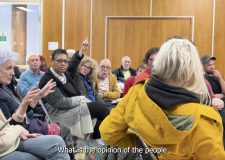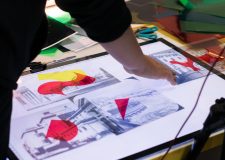Angel’s Touch
Sarah Bellamy is using her experience as a nurse to help others after her husband died in hospital. Frank le Duc reports.

Sarah Bellamy has been a qualified nurse for 26 years. She has been a widow for a year. Her husband Stuart died in January last year. She had a clearer view than most of how things might have been done differently and has been working with the Royal Sussex County Hospital on a checklist for clinical staff to help prevent avoidable deaths in future.
A short but powerful film in which she set out her experiences was shown to a board meeting of the hospital trust. It has been shown to doctors and nurses, who can sometimes struggle to work out what’s wrong with a patient. And it will be shown to medical students before they are asked to make life or death decisions for real. Stuart was being treated as though he had a kidney stone when he had a huge blood clot blocking the main artery to his lungs – a pulmonary embolism.
Sarah said: “Stuart was transferred to an orthopaedic ward under the care of the urology team. There was a bed crisis at the time. I got a panicky call from Stuart. (He said) they’re taking me to theatre. He sounded absolutely terrified. I spoke to the ward sister. She was unaware that the urology team had reviewed him. She was very concerned that his breathlessness was still quite pronounced. (He) clearly wasn’t in a fit state for theatre and hadn’t been seen by an anaesthetist.
“I asked the ward sister if she would get the urology registrar to come back and speak to me which she did. The urology registrar came back. I outlined my concerns about his breathing. He sort of slightly brushed it off and said, oh well, we won’t bother then. I was just going to stent him and send him home but perhaps not.
“By this time Stuart had had a CT scan which seemed to indicate that there might be stones but Stuart didn’t have any more pain. He didn’t have any sign of infection. But he was still struggling with breathlessness. It was painful to watch him.
“I was struggling to work out what was going on and I felt that people weren’t asking the right questions or that in fact his care was being not so much shared but passed about from one individual to another. I never felt that anybody had the overall picture of what was going on. I felt that we’d lost the plot really.
“I got a call at half past six in the morning from the ward to say that I needed to come into the hospital. Stuart had taken a turn for the worse. I’ve been a qualified nurse for 26 years. I know what that means. As I walked on to the ward I saw a young woman. She said we need to sit down somewhere and have a chat. I said we really don’t. You need to just tell me that he’s died because I know that he has.
“At that point she started to cry and I gave her a hug and said it’s all right. And it obviously wasn’t all right. We’d been married for 23 and a half years and I felt that we had a lot of years left in us. He was the love of my life. And my children at 16 and 18 were really not ready to lose their dad.
“The truth was hard to hear that he had died of bilateral PE. His mum had had a PE at 50 and so there was a proven family history which obviously the medical teams were aware of. Stuart was very high risk for a PE. It was all there really. The information was there. It was just buried in the notes and buried in the minds of the people who were managing him.
“I believe that a checklist is the way forward. I believe that it’s vital for the way that we are in medicine in the 21st century. I believe it protects staff. I believe it protects patients. And I believe that if we don’t do it, we will have to answer for that.
“I would rather justify doing something that might slow us up slightly, or might seem repetitive, might seem a little bit of overkill perhaps. I would rather have to justify that to colleagues than have to justify not using something which could save somebody’s life.”
The film ends with the words: “Stuart died of massive pulmonary embolism. He was 46. He didn’t even receive VTE prophylaxis (clot busting drugs). Stuart never did have a kidney stone.”




















